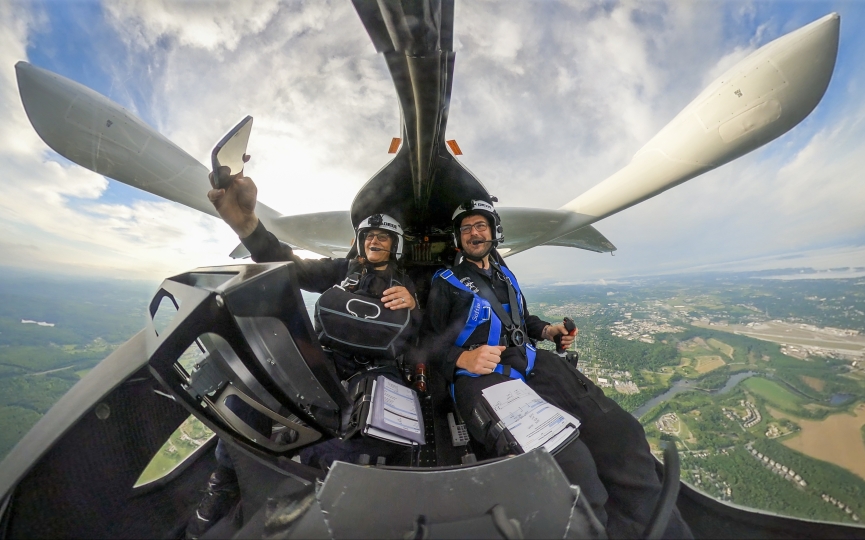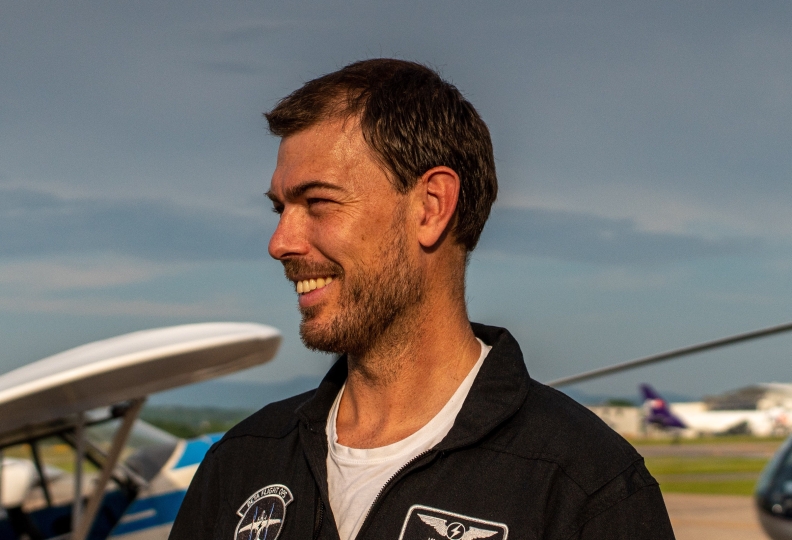Kyle Clark’s dorm room at Pforzheimer House was filled with model airplanes and motorcycle parts. Clark, A.B. ‘04, was already passionate about flight and aerospace engineering when he arrived at Harvard, and that grew even stronger as he studied materials science through the engineering science concentration at the Harvard John A. Paulson School of Engineering and Applied Sciences (SEAS).
SEAS alum Kyle Clark, right, flying in the ALIA with Beta Technologies initial investor and customer Martine Rothblatt. (Brian Jenkins/BETA Technologies)
Today, Clark is the founder and CEO of Beta Technologies, a Vermont-based electric aerospace company that could revolutionize air transport — and combat climate change. The company’s aircraft — called the ALIA — is fully electric and designed for cargo missions, able to carry up to three standard pallets and a pilot, or five people and a pilot in passenger configuration. It will be capable of traveling 250 miles before needing to be recharged.
“I’m absolutely thrilled to be able to do something that I love with an awesome team in a space that’s meaningful,” he said. “To think that our little company in Vermont, based on a little idea for an aerospace company, is getting the traction that it’s gotten, and we can do it at a scale that will actually help turn the corner on climate change, is remarkable.”
Clark founded the company in 2017 after a meeting with Martine Rothblatt, whose biotech company, United Therapeutics, manufactures organs for transplant. Rothblatt was interested in building an electric aviation system to make it easier to transport organs across longer distances — without emitting more carbon. After speaking with Clark and seeing his designs for an electric plane capable of vertical liftoff and landing, she invested $1.5 million in capital.
“With a small amount of money, we designed, built and flew an eight-rotor aircraft 100 times,” Clark said. “She helped fund the construction of not just a model, but a real flying airplane. That’s when I dropped everything else I was doing. This was my shot of making Beta real.”
The ALIA is currently undergoing extensive flight testing as the team finalizes the prototype design before engaging in the formal Federal Aviation Administration certification process. BETA is targeting certification for commercial operations in 2024. But that hasn’t stopped Beta from continuing to grow, securing $375 million in Series B investment from both institutional investors and companies like Amazon, through its Climate Pledge Fund. Beta has already pre-sold units to cargo companies like UPS and LCI, and the passenger helicopter company Blade has also pre-ordered units. Beta also has contracts with the U.S. Army and Air Force.
The ALIA is only part of Beta’s business plan. The other is a charging infrastructure designed to service both electric planes and other electric vehicles. The company has already constructed enough stations to successfully fly from New York to Arkansas, a distance of over 1,200 miles - which it did in June of this year.
Each charging station is equipped with an array of Beta Technologies batteries that have degraded too far to be usable in a plane. But stacked together, they still can store enough power from renewable energy sources to quickly charge a plane without overburdening the local power grid.
“The best form of recycling is reusing,” Clark said. “Power is still coming, but that power is coming in at a steady state or optimal time.”
Clark named his company after a nickname he acquired during his hockey career. He played on the U.S. national under-18 team in high school, then went on to play three seasons with the Crimson. The Washington Nationals drafted Clark in 1999, and he left school in 2001 to play three years of professional hockey in the NHL minor leagues and overseas.
As his hockey career wound down, Clark wanted to return to college and complete his degree.
Kyle Clark, A.B. '04 (Brian Jenkins/BETA Technologies)
“Harvard not only encouraged me to come back, they enabled it,” he said. “They got me set up so my wife and kid could come down there with me and I could really focus on academics. They enabled me to do what I knew was the right decision, because my alternative at the time, which I thought very realistically about doing, was to just dive right into working and try to make ends meet.”
Clark excelled academically upon his return to Harvard. For his senior capstone project, which was awarded thesis of the year honors, he designed and built a plane powered by a motorcycle engine, a full-motion flight simulator, and a digitally simulated model of the plane. His advisors were John Hutchinson, Abbott and James Lawrence Professor of Engineering, and Robert Howe, Gordon McKay Professor of Engineering.
“One thing I recognized was that aircraft engines are archaic,” he said. “They’re 1950s technology that have massive displacement, are pretty heavy and terribly fuel inefficient, and certainly aren’t very power-dense. I rode my motorcycle a lot with pressure transducers to understand how its motion could translate to two-dimensional flight during a coordinated turn, and then translate that into three-dimensional flight. That ethos of build it and don’t overanalyze it has carried through to Beta.”
Clark’s senior thesis wasn’t the first plane he built at Harvard. In “The Art of Electronics,” a course taught by Thomas Hayes, Lecturer on Physics, Clark built a remote-controlled helicopter that hovered over an array of infrared sensors and self-stabilized, similar to the work being conducted today at Beta.
“It was an incredibly practical class,” Clark said. “Every embodiment of experimentation and construction that they taught in that class was what I implemented. I can’t be any more thankful for the people that enabled me. I worked in a materials science lab, where I was given every opportunity to learn and build things in the machine shops there. It really catalyzed the ethos that we have here.”
Beta Technologies is in many ways the culmination of everything Clark cares about: aviation, aerospace engineering, power and electronics, entrepreneurship, sustainability and climate change.
Harvard gave him the chance to pursue those passions, and he’s using them to change the world.
“When you’re 18 years old and you think you want to learn about jet propulsion or aircraft structures, really what you need to learn is physics,” he said. “Whether you’re doing electromagnetics or materials science or fluid dynamics, it’s all the same math and physics. It was the best decision to come to Harvard and get a phenomenal education in how to think about physics, and then apply that to aerospace.”
Press Contact
Matt Goisman | mgoisman@g.harvard.edu

